
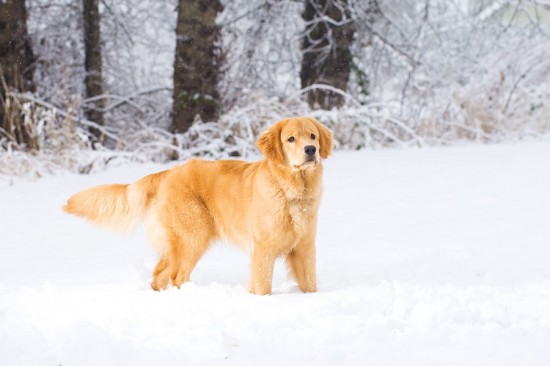
The leaves are falling from the trees, the darker evenings are upon us and there’s a distinctive nip in the air... Yes, winter is just around the corner. Just as you may have to take special care in the summer to make sure your dog does not overheat and stays safe and healthy during the warmer months, you should also take a little extra care during the winter to make sure your dog is warm enough, comfortable and healthy.
Read on for our top ten tips and things to consider when caring for your dog over the winter.
If you find yourself reaching for your coat when it’s time for walkies, spare a thought for your dog’s needs too! While the majority of dogs grow a suitable coat to protect them from the vagaries of the colder weather, some dogs are less hardy than others, and may need a little extra help to keep warm. If your dog shivers when outside, seems less keen to go out than usual or shows other symptoms of being cold, it may be worth considering getting them their own canine coat. These specially designed dog coats are available for all sizes of dog, from the tiniest Chihuahua up to giant breeds, and can provide a valuable extra layer of warmth in the colder weather.
Similarly, make sure that your dog’s bed or the rooms in which he spends his time are suitably heated, and away from any draughts or damp patches.
Your dog’s body fat is essential for protecting him from the cold and maintaining his core body temperature during the winter months. Dogs do tend to weigh slightly more during the winter than in the summer, and you may need to up his feeding rations accordingly. Take care not to overfeed, however, and bear in mind that the colder months can lead to reduced levels of activity in your dog, making it easy to inadvertently pile on the pounds. Keep an eye on your dog’s food intake and weight, and be prepared to alter their feeding rations according to the season and your dog’s activity levels.
Don’t forget to keep your dog hydrated, and make sure clean, fresh water is freely available at all times.
Ice, snow, slush and the grit or chemicals used to clear the roads and pavements of ice can all take their toll on your dog’s feet. Pay special attention to your dog’s paws during the colder months, and be on the lookout for any sore patches, cracks or cuts. Dry your dog’s feet thoroughly when coming in from the wet or snow, and try to avoid long walks over hard ground or rough terrain.
In the colder weather, your dog will take longer to warm up and loosen their joints and muscles when exercising, so take things gently at first when playing catch or running around. The cold air temperature and harder ground can both take their toll on your dog’s joints and muscles, so give them time to acclimatise to being outdoors.
Remember that ponds or lakes that are iced over will look just like normal terrain to your dog, so try to keep your dog from walking on them as they may be unable to support the weight of your dog and cause a potentially dangerous incident.
Just as humans often become more prone to viral infections such as coughs and colds during the winter months, your dog will be more susceptible to them as well. A strong immune system is important in helping your dog to fight off viruses and infections, so make sure that your dog is in tip top health coming into the winter. Consider feeding a vitamin supplement if needed to give your dog an extra boost.
Some medical conditions such as arthritis become much more pronounced during the cold weather, so you should account for this if your dog has any ongoing medical concerns or conditions. Keep them warm, be alert to the signs of pain or discomfort, and talk to your vet if you need a little extra help.
The cold weather is often a hard time for motorists, who have to deal with the problems of iced windscreens, temperamental engines and frozen radiators. Antifreeze becomes a staple in many homes and garages during the winter months, and unfortunately antifreeze is highly toxic to dogs. It also has a sweet smell and taste, meaning that your dog is much more likely to consider drinking it than the majority of other toxins, which can be incredibly dangerous and sometimes fatal.
Never leave open containers of antifreeze lying around, clear up any spills quickly, and keep any and all toxins safely out of reach of your dog (and children).
When its cold, your dog may be keen to snuggle up to the nearest available source of heat, be that a radiator, open fire or hot water bottle. Burns or scalds can happen quickly, so make sure that you use a pet proof fireguard in front of any open hearth, ensure that hot water bottles are well sealed and not leaking, and keep an eye on your dog around heat sources.
In the lead up to winter, your dog will shed his lighter summer coat and grow a thicker, heavier winter coat to see them through the colder months. The thicker and heavier the coat, the more likely it is to become matted or knotted- and to harbour fleas. Groom your dog regularly during the winter, making sure that you use a comb as well as a brush to get right down to the skin.
Elderly and mature dogs are much less able to deal with the changing seasons and vagaries of the colder weather than their younger counterparts, and need special care and attention during the winter. Older dogs are unable to regulate their body temperature as effectively as young dogs, so take care to keep your mature dog warm enough at all times.
Issues such as muscle and joint strains caused by walking and playing on hard ground are all amplified in the older dog, and elderly dogs have a tendency to injure more easily. Remember your dog’s age when walking and playing, and make allowances accordingly. Keep an eye on your older dog’s health, wellness and general condition, as they may be more susceptible to winter coughs and colds.
Common sense goes a long way to seeing your dog through the winter months safely and comfortably, so use your judgement when considering temperature, feeding, exercise and general care. Don’t get overly hung up on the potential issues that winter can bring- dogs can generally manage the colder months perfectly comfortably, and have been doing for millennia.
Just pay a little extra attention to your dog’s needs, think ahead, and be on the lookout for the warning signs of any problems. Many dogs love playing in the snow and crisp winter air just as much as we do- enjoy your winter with your dog, and stay warm!
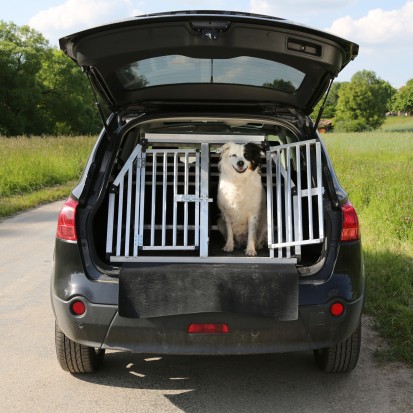 8 Travel Tips For Dogs (within The Uk)
8 Travel Tips For Dogs (within The Uk)
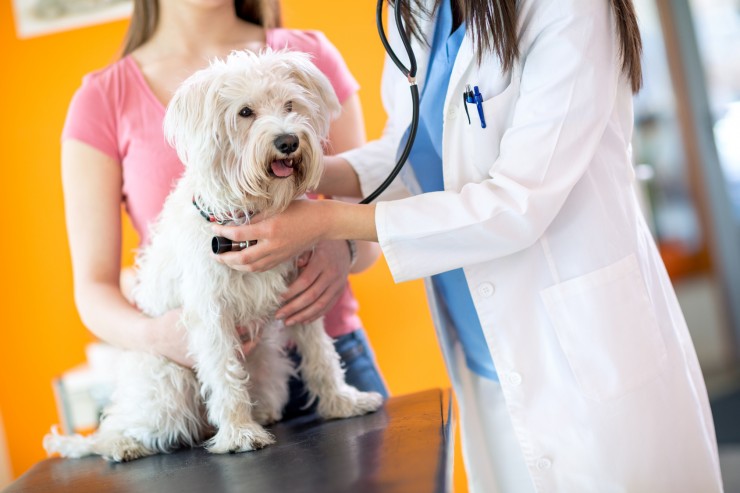 The Real Cost Of Vet Care For Dogs And Cats
The Real Cost Of Vet Care For Dogs And Cats
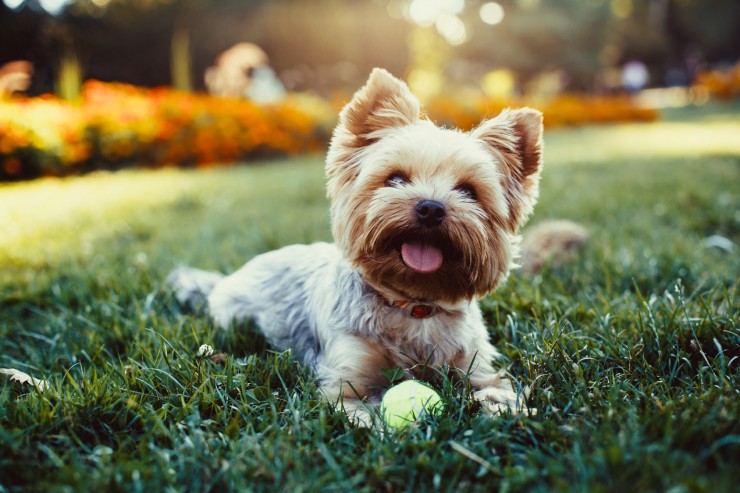 Hepatic Lipidosis In Dogs
Hepatic Lipidosis In Dogs
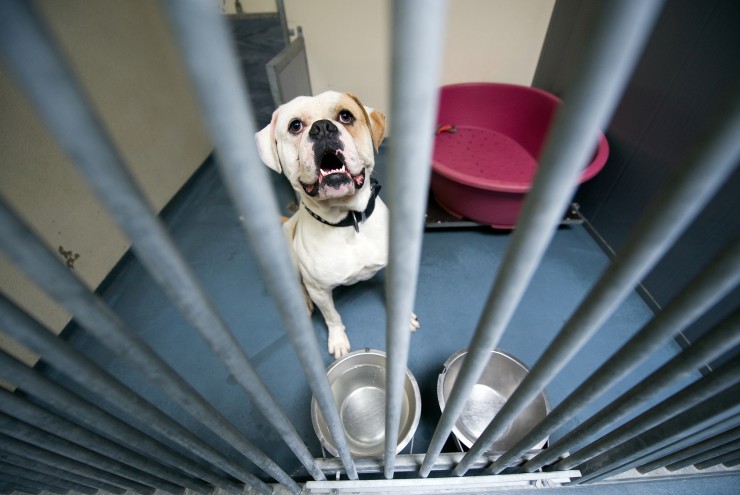 Seven Top Tips For Kennel Boarding A Dog That Suffers From Separation Anxiety
Seven Top Tips For Kennel Boarding A Dog That Suffers From Separation Anxiety
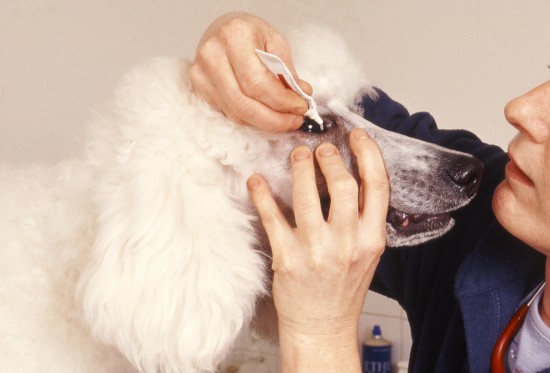 How To Administer Eye Drops Or Eardrops To Your Dog
How To Administer Eye Drops Or Eardrops To Your Dog
 Why Is It Important To Wear The Right Clothes For Horse Riding?
Why Is It Important To Wear The Right Clothes For Horse Riding?
 Bedding Material to be Used over the Flooring of your Chicken Coops
Bedding Material to be Used over the Flooring of your Chic
Bedding Material to be Used over the Flooring of your Chicken Coops
Bedding Material to be Used over the Flooring of your Chic
 Why We Like Dogs Better Than People
Why We Like Dogs Better Than People
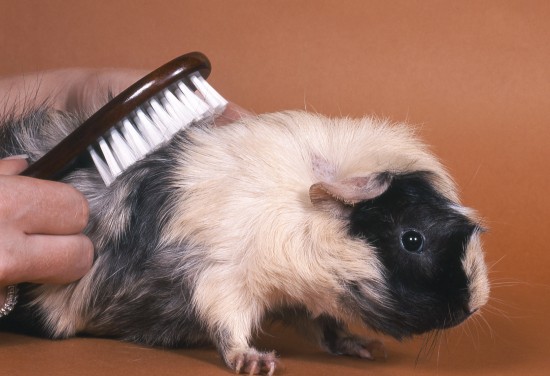 Top Grooming Tips For Guinea Pigs
Top Grooming Tips
Top Grooming Tips For Guinea Pigs
Top Grooming Tips
 How To Recognise Taurine Deficiencies In Kittens
How To Recognise
How To Recognise Taurine Deficiencies In Kittens
How To Recognise
 Keep your pet animal safely in your absence in pet day care
Keep your pet animal safely in your absence in pet day car
Keep your pet animal safely in your absence in pet day care
Keep your pet animal safely in your absence in pet day car
Copyright © 2005-2016 Pet Information All Rights Reserved
Contact us: www162date@outlook.com